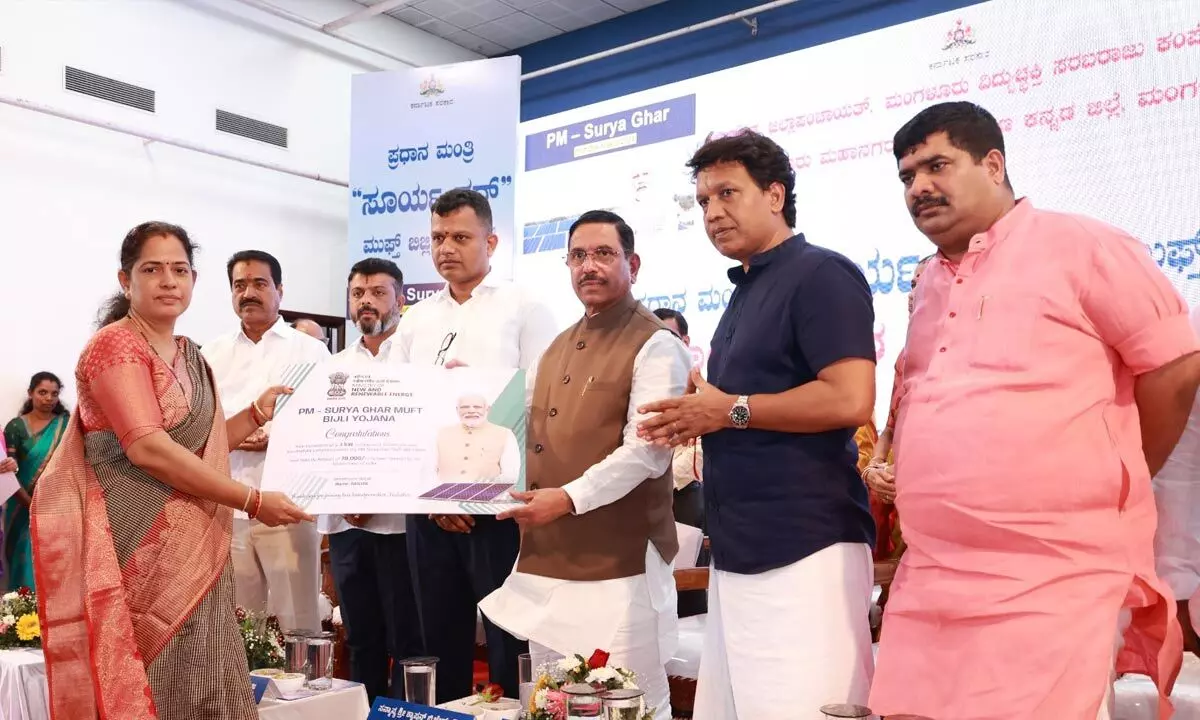Live
- NFR issues notice to 20 GCPA leaders for disrupting railway services
- Bengal school job case: CBI submits third supplementary charge sheet
- Opelka beats Mpetshi Perricard in Brisbane, reaches first final since 2022
- RJD to convene national executive meet in Patna on Jan 18
- ‘Temple’ shirt row continues in Kerala
- Rajnath Singh to present 'chadar' at Ajmer Sharif Dargah on Jan 5
- No Entry to Collectorate Without a Helmet - Collector Badavath Santosh
- Every Pregnant Woman Deserves Safe Motherhood -DMHO Dr. K.V. Swarajyalakshmi
- Human Metapneumovirus (HMPV) Surge in China: Is It Similar to Covid-19?
- Bengaluru Gears Up for Anniversary Show of Classic Motorcycles
Just In
India’s Solar Revolution, Surya Ghar Muft Bijili Yojana to Transform Energy Sector


India has made remarkable progress in solar energy, increasing its solar power capacity from 2.3 gigawatts (GW) a decade ago to 93.5 GW today, with solar modules capable of producing 60 GW under 300 sunny days annually.
Mangaluru: India has made remarkable progress in solar energy, increasing its solar power capacity from 2.3 gigawatts (GW) a decade ago to 93.5 GW today, with solar modules capable of producing 60 GW under 300 sunny days annually. Highlighting this achievement, Union Minister for Renewable Energy and Consumer Affairs, Prahlad Joshi, introduced the Surya Ghar Muft Bijili Yojana, an ambitious scheme aimed at making households self-reliant in energy production through solar power.
Addressing a consultative meeting with consumers, electricity supply company (Escom) officials, and people’s representatives in Mangaluru on Thursday, Joshi emphasised the transformative potential of solar energy. “The people of this country should aim to produce solar power and become independent energy producers instead of relying on government-provided freebies,” he remarked.
A Shift Towards Sustainability
The Surya Ghar Muft Bijili Yojana, part of Prime Minister Narendra Modi’s vision for a greener and self-sufficient India, promises free, self-generated solar power for households across the nation. Joshi underlined the environmental and economic benefits of renewable energy, comparing it to the significant costs associated with coal-based thermal power generation.
“In the previous regime, 2.5 lakh tonnes of coal were mined at enormous costs, causing significant environmental degradation. Transitioning to renewable energy under this government showcases the Prime Minister’s clear vision for sustainability,” he said.
Climate and Economic Challenges
Joshi warned of critical climate challenges, citing data that predicts dangerous heat levels on Earth by 2050 without immediate intervention. “By 2030, we must reduce reliance on heat-generating power modules. Rising temperatures already witnessed in Rajasthan and Gujarat, with some regions recording 50°C in 2024, highlight the urgency. Failure to act could reduce the GDP by 19% due to health-related manpower losses,” he cautioned.
The Future of Renewable Energy
Highlighting advancements in solar technology, Joshi revealed ongoing research to extend the lifespan of solar units from 25 to 40 years and enhance their efficiency. The government is also exploring other renewable energy sources such as tidal, wind, and geothermal power.
Global Leadership in Solar Energy
Captain Brijesh Chowta, Member of Parliament for Dakshina Kannada, praised India’s leadership in forming the world’s largest solar alliance with 100 partner countries. He urged public representatives to ensure the benefits of the Surya Ghar Muft Bijili Yojana reach every household.
MLAs, Vedavyas Kamath, (Mangaluru south) Dr. Bharath Shetty (Mangaluru North), Harish Poonja (Belthangady) N Ravi Kumar MLC were also present.
Beneficiaries of the Surya Ghar Muft Bijili programmes also narrated their experience on this occasion.

© 2024 Hyderabad Media House Limited/The Hans India. All rights reserved. Powered by hocalwire.com






